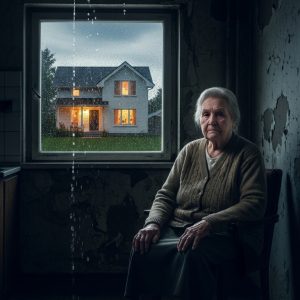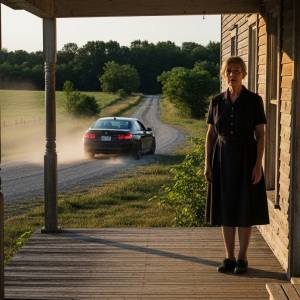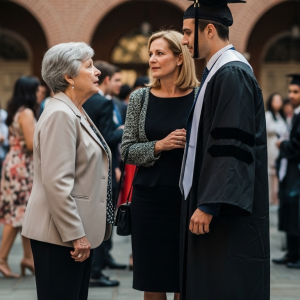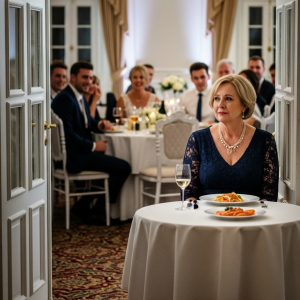I write this knowing that in my daughter’s story, I am the villain. It is a role I cast myself in, a truth I have spent years avoiding. But even villains, I’ve learned, crave a redemption they have not earned. I am forty-three years old, and for the last three years, my only daughter, Chloe, has looked at me with the vacant eyes of a stranger. I shattered our relationship. I know that. But time is supposed to be a healer, isn’t it? A great, slow-moving river that erodes the sharpest edges of pain. For me, it has been a stagnant pool, preserving my failure in perfect, agonizing detail.
The schism, the great and terrible breaking of our world, began when I married my current wife, Isabella. She is twenty-one now, a woman of sharp intelligence and a beauty that still catches my breath. When we started dating, she was only eighteen. She was also my daughter’s best friend. They were the same age, navigating the same final year of high school, sharing secrets I was not privy to. My decision to pursue Isabella was not a careless one; it was a detonation. It sent shockwaves through the quiet, predictable landscape of our lives.
Friends I had known for decades condemned me in hushed, disappointed tones over phone calls that quickly grew infrequent. My ex-wife’s fury was a wildfire I had expected. But it was Chloe’s reaction that hollowed me out, leaving a crater where my heart used to be. She didn’t scream or rage. She pleaded. She stood in the living room of the house she grew up in, her eyes brimming with a profound pain I refused to truly see, and begged me to stop. She begged Isabella to leave me, to remember their friendship, to see the wreckage she was complicit in creating. Her pain was an inconvenience to my newfound happiness, an obstacle I was determined to overcome.
The pressure mounted over weeks of tense dinners and avoided glances. It all came to a head during one terrible, unforgivable argument. The air in the room was thick with unspoken resentments. Chloe stood before me, no longer a child but a woman forged in the fire of my betrayal, and she asked me a simple question: “Don’t I matter to you at all?”
I snapped. The words that left my mouth were a poison, a venomous tide I can never reclaim. I looked at my own child, the girl I had taught to ride a bike and held through fevers, and I delivered the killing blow.
“You know what?” I said, my voice dripping with a cruelty I didn’t know I possessed. “Sometimes I wish you had never been born. You stand there, a constant reminder of a life I don’t want anymore. You are standing in the way of my happiness, and for that, I will always resent you. You mean nothing to me.”
That was the day my daughter died to me, and I to her. She didn’t cry. A chilling calm settled over her features. She simply nodded, turned, and walked out of the house. That was the last time she ever spoke to me. A wall of impenetrable silence rose between us. I told myself I was happy. I had Isabella. I had a new life. But recently, a gnawing emptiness, a hollowness that even Isabella’s laughter couldn’t fill, led me to the last place I could see her: her social media profile.
And there it was. A picture of her, radiant and smiling, a brilliant diamond ring on her finger. She was engaged. I, her father, found out through a filtered photo online, another anonymous follower in a sea of strangers. The magnitude of my failure hit me like a physical blow, stealing the air from my lungs. I had to get her back. I had to try.
My first attempts were a frantic, desperate volley into the void. Text messages, emails, voicemails—all met with the digital silence of a blocked number. I was a ghost haunting the periphery of her life, unable to make a sound. Then, after weeks of this futile effort, a miracle. A short, sterile text message materialized on my screen. It was from her.
I want to meet.
Hope, foolish and blinding, surged through me. It was a dizzying, reckless feeling. I was already picturing our reconciliation, the tearful embrace, the slow mending of our fractured bond. Then, a follow-up message arrived, a cold splash of reality that sobered me instantly.
My grandparents pressured me into this. They think you deserve one last chance to speak your piece. Don’t make me regret it.
The words stung, a sharp reminder of my true position. I wasn’t being welcomed back; I was being granted a parole hearing, and only at the insistence of others. Still, it was a chance. It was a crack in the wall, a sliver of light in the darkness I had created. It was a chance to fix the unfixable.
We were to meet at a local park, Oakwood Grove, on Saturday at 3:00 PM. I spent the days leading up to it rehearsing speeches in my head, crafting the perfect apology, the one that would convey three years of silent regret.
That Saturday morning, however, the world I had built for myself refused to be ignored. Isabella was particularly enchanting. Her laughter filled our sun-drenched apartment as she danced around the kitchen making coffee. She pulled me close, her scent, a mix of vanilla and jasmine, intoxicating me. One thing led to another, and I found myself lost in her embrace, the world outside—my past, my failures, my daughter—fading away into an irrelevant blur. The clock on the wall was just a decorative object, its hands spinning in a time that was not my own.
When I finally surfaced from our passionate haze, wrapped in sheets and the warm glow of the afternoon sun, a glance at my phone sent a bolt of pure, sickening panic through me. The screen glowed with the time: 3:45 PM.
I scrambled out of bed, throwing on clothes with frantic, clumsy movements. I rushed to the park, my heart hammering against my ribs, each beat a drum of my own failure. I saw her from a distance, a solitary figure on a park bench near the old oak tree. She wasn’t looking at her phone. She wasn’t pacing angrily. She was just sitting there, staring out at the duck pond with an air of profound resignation. It was the look of someone whose lowest expectations had just been met and confirmed.
“Chloe,” I stammered, breathless as I skidded to a stop in front of her. “I am so, so sorry. I just… I lost track of time.”
She looked up at me, and her eyes were chillingly empty. The fire, the pain, the pleading I remembered from three years ago—it was all gone. All that was left was a calm, barren landscape.
“You didn’t ‘lose track of time,’ Dad,” she said, her voice flat and steady, each word a carefully placed stone. “You made a choice. The same choice you’ve been making for three years. This wasn’t just a meeting. This was a test. And you just proved, once and for all, who and what will always come first for you. It was never me.”
I tried to explain, to apologize, to somehow articulate the chaotic pull between my past and my present, but my words were useless, hollow excuses that dissolved in the air between us.
“Just make your parents leave me alone,” she said, standing up with a grace that felt utterly final. “Tell them they can stop fighting for you now. This is over. You are not my father anymore. And for the record, you are not invited to my wedding. My uncle will be walking me down the aisle.”
Just then, a young man appeared at her side, stepping into the space next to her as if he had always belonged there. He took her hand, his presence a quiet, protective shield. She didn’t even introduce us. They turned and walked away, a complete and perfect world without me in it.
The silence they left behind was deafening, filled only by the sound of the final bridge between us burning to the ground. My parents have been calling, their voices a mixture of anger and heartbreak, furious that I squandered the one chance they had fought so hard to give me. But as I sit here now, with only my wife by my side, I am forced to face the one, undeniable truth: my daughter was right. I made my choice long ago. This emptiness, this silence, this is just the consequence.
The drive back from Oakwood Grove seemed to last an eternity. Each red traffic light was a cruel pause, forcing me to confront my own reflection in the windshield: a forty-three-year-old man with the panicked eyes of a boy who had just shattered something irreplaceable. The world outside the car’s windows moved on—couples walking dogs, children laughing on a playground—each normal scene an indictment of my own broken life. They were all part of a universe from which I had just been permanently exiled.
I drove aimlessly for nearly an hour, navigating familiar streets that now felt alien. Chloe’s childhood home, her elementary school, the ice cream shop we went to after every good report card. These places were no longer markers of a shared life; they were tombstones, memorials to memories I no longer had the right to visit. The image of the burning bridge filled my mind, no longer a single spark but a roaring inferno, consuming every possible path back to her.
Chloe’s voice echoed in the silence of the car, not her anger, but the chilling calm of it. “You made a choice.” It was a simple, undeniable truth. It was not an accident. It was not a moment of forgetfulness. It was a conscious decision, repeated over three years, culminating in this final, pathetic failure. I had chosen an hour of passion over a lifetime’s chance at redemption.
When I finally pulled into the garage of my apartment building, the modern structure of glass and steel felt colder and more sterile than ever before. It was the perfect symbol of my new life—sleek, beautiful, and utterly devoid of history. I parked the car, but I couldn’t bring myself to turn off the engine. I just sat there, hands gripping the steering wheel, listening to the low hum, the only sound in the world that seemed to understand the gnawing emptiness inside me.
I walked into the apartment, the door clicking shut behind me with a soft, final sound. Isabella was in the kitchen, humming along to a song on the radio. She turned, a radiant smile on her face, her hair catching the afternoon light. “You’re back!” she said, her voice bright as a bell. “I was about to call. How did it go?”
She moved toward me, wrapping her arms around my neck to kiss me. Her lips tasted of coffee and carefree sweetness, but I couldn’t respond. I felt like a statue, cold and unmoving, a hollow man standing in the center of his self-made paradise. She pulled back, her smile faltering as she searched my face. Concern replaced her cheerfulness.
“Michael? What is it? What’s wrong?”
The words caught in my throat. I couldn’t form the sentence, couldn’t give voice to the magnitude of my failure. I simply shook my head, pulling away from her embrace to sink onto the edge of our designer sofa. “It’s over, Izzy,” I finally managed to say, the words feeling like shards of glass. “It’s completely over.”
Her expression softened with a youthful sympathy that, for the first time, felt entirely inadequate. “Oh, baby. I’m so sorry,” she said, kneeling in front of me. “Don’t worry. She’s just hurt. She’ll come around. You tried, that’s what matters.”
“No,” I said, looking into her clear, beautiful eyes, realizing she would never understand. “You don’t get it. She won’t come around. This was the last time. I was late. I failed the test.”
She tried to comfort me, her hands rubbing my shoulders. “Well, you have me now,” she whispered, her voice a soothing balm meant to heal a wound she couldn’t see. “We’re happy, aren’t we? This is our life now.” Her words, intended as a comfort, felt like the heavy clang of a cage door swinging shut. I looked around the perfect room, at this perfect woman, and realized my new life was not a refuge from my pain. It was the very thing that had cost me everything.
My phone rang later that evening, a jarring noise in the heavy silence that had fallen between me and Isabella. The caller ID flashed: Mom. I stared at it, my thumb hovering over the decline button. Isabella, sensing my hesitation, whispered, “You don’t have to answer that. You don’t need the drama.” But I knew I did. I had to face this. I stepped out onto the balcony and accepted the call.
The conversation was not a yelling match. It was far worse. It was a quiet, cold, and devastating judgment. “Your father and I just got off the phone with Chloe,” my mother began, her voice devoid of its usual warmth.
I tried to stammer an apology. “Mom, I know. I messed up. I was late, I—”
She cut me off. “This isn’t about being late, Michael. This is about who you are. We asked your daughter to give you this chance. We begged her. And you showed her, and us, exactly what your priorities are. You confirmed everything she has believed about you for the last three years.”
“It wasn’t like that,” I pleaded, the defense sounding weak even to my own ears.
“We’re done,” she said, the words precise and final. “We are done fighting for you. We will be at our granddaughter’s wedding. Her uncle is walking her down the aisle, and we will be there to support her. You have made your bed, Michael. We are now making our choice.” The line went dead. I stood there, the phone pressed to my ear, listening to the dial tone. I was no longer just estranged from my daughter. I was an outcast from my own family.
The weeks that followed blurred into a monotonous ache. The initial, roaring fire of my passion for Isabella cooled into embers we had to work to keep alive. The excitement of our forbidden love was replaced by the mundane reality of daily life, and the cracks in our foundation began to show.
I started to notice the age gap not as something thrilling, but as a chasm. The pop music she played grated on my ears. The slang she used with her friends made me feel ancient and out of place in my own home. I was living in a world that wasn’t mine, one I had chosen but could never truly belong to.
Worse, I started seeing Chloe everywhere. A girl with the same fiery hair laughing in a cafe. The sound of a young woman calling out “Dad” in a grocery store. Each instance was a small, sharp torture, a reminder of the ghost that now haunted my every waking moment. I created a fake social media profile, a ghost in the digital machine, just to watch her life unfold from an impossible distance.
I saw the pictures from her wedding shower, her smiling with friends, her mother at her side. I saw posts about her bachelorette party. I was witnessing all the milestones a father is meant to be a part of, but as an invisible, silent specter. The wedding date grew closer, a fixed point on the calendar, a day of celebration for everyone but me. I realized my new life hadn’t replaced the old one. It was just a beautifully decorated distraction from the gaping hole it had left behind.
The wedding day arrived under a clear, painfully blue sky. Isabella, sensing my somber mood, tried to be the perfect distraction. She suggested a spontaneous trip, a fancy dinner, anything to escape the reality of the day. But I couldn’t engage. My body was in our apartment, but my mind was elsewhere, at a church, at a reception, watching a life I was forbidden to see.
Later that afternoon, I found myself alone in my home office. I opened a blank document on my laptop, the cursor blinking patiently on the white screen. And I began to write. It was a letter to Chloe, but this time, there were no excuses.
My Dearest Chloe, I typed. There is no apology that can fix what I have broken. The truth is, I failed you not because I lost track of time, but because I am a coward. I was afraid of getting old, of being alone, of the quiet life that was settling around me. I saw in your friend, in Isabella, a chance to escape that, and I took it. I was selfish and weak.
I wrote for over an hour, a raw and brutal confession. I admitted that the cruel words I spoke to her were born from the ugly shame I felt for my own actions. I acknowledged that I failed the test in the park because, at my very core, I am the man who makes that selfish choice. The act of writing was a purge, the apology I was never strong enough to speak.
When I finished, I read it over. For a moment, I felt a flicker of relief. Then, a new, devastating realization dawned on me. To send this letter would not be for her. It would be for me. It would be one last, selfish intrusion on the happiest day of her life, a demand that she stop and acknowledge my pain.
In a moment of quiet clarity, the first truly selfless act I had performed for her in years, I moved the cursor to the delete button. I watched as three years of pain and a lifetime of failure vanished from the screen. I was left sitting in the silence of my perfect life, with only the phantom weight of the unsent letter for company. I had what I chose. But I was utterly and completely alone, forever haunted by the ghost of the father I had failed to be.




